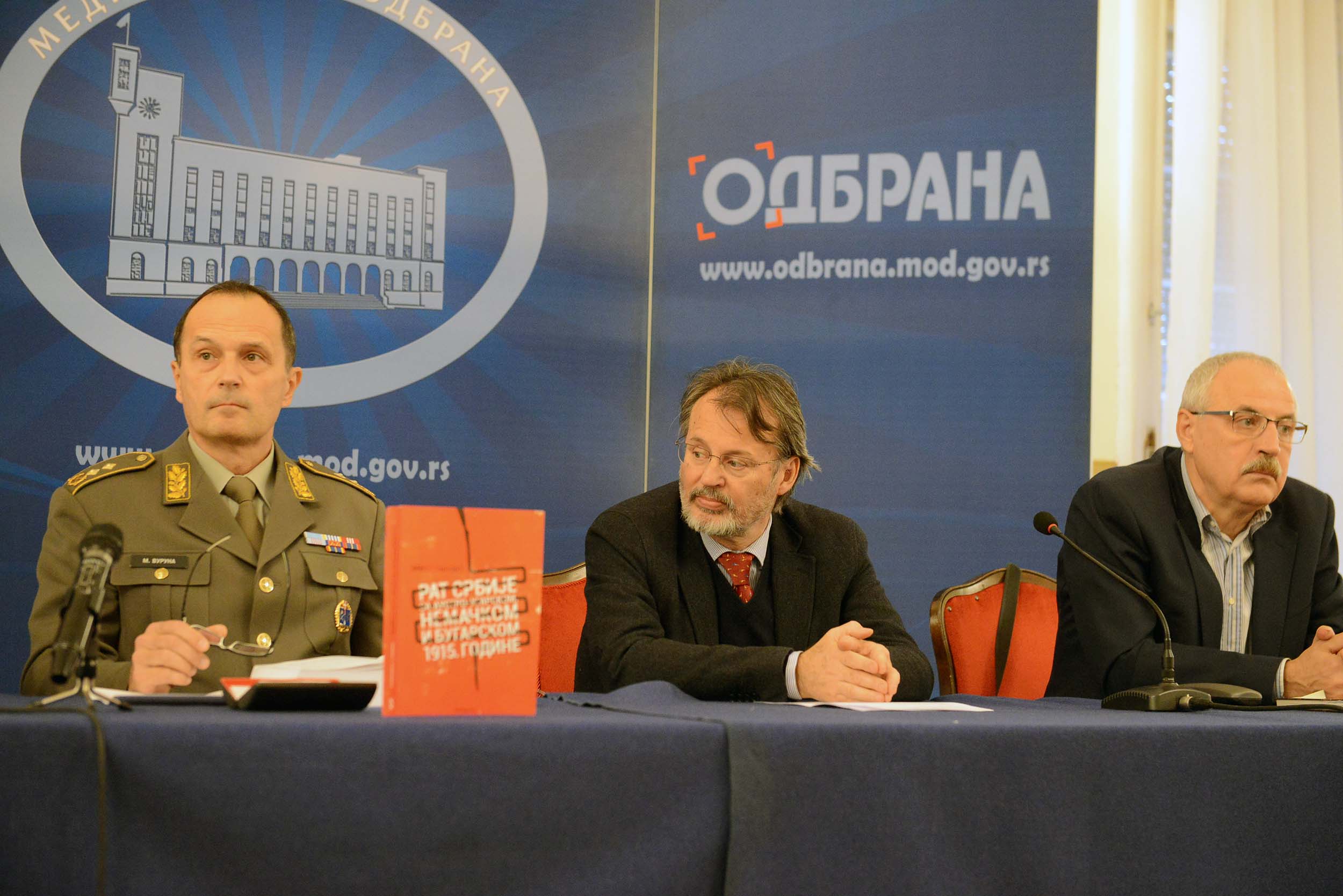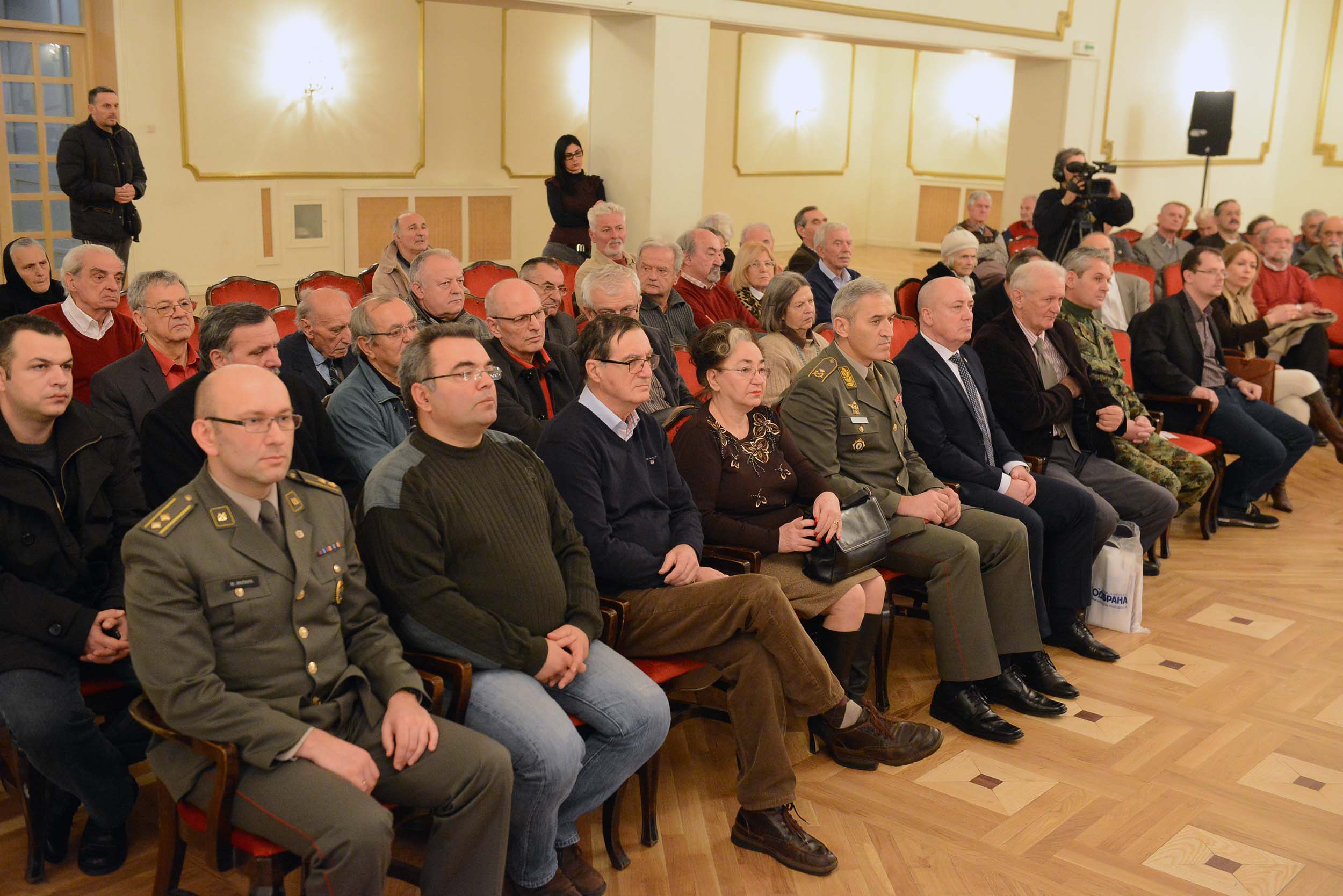11.12.2017.
Presented book "War of Serbia against Austria-Hungary, Germany and Bulgaria in 1915"
The book "War of Serbia against Austria-Hungary, Germany and Bulgaria in 1915", by General Živko G. Pavlović, has been promoted in the Ceremonial Hall of the Central Military Club today. State Secretary in the Ministry of Defence Aleksandar Živković, daughter of Živojin Pavlović, members of the Ministry of Defence and the Serbian Armed Forces and numerous guests attended the presentation of the unique book.
 Director of Odbrana Media Centre Colonel Stevica S. Karapandžin stressed that in the last three years, as long as Serbia has marked the centenary of the Great War, 30 books dedicated to that event were released from the publishing activity of the house he runs. He stressed that he was especially pleased that the book by Živko Pavlović, one of the most knowledgeable officers Serbia had, saw the light of day.
Director of Odbrana Media Centre Colonel Stevica S. Karapandžin stressed that in the last three years, as long as Serbia has marked the centenary of the Great War, 30 books dedicated to that event were released from the publishing activity of the house he runs. He stressed that he was especially pleased that the book by Živko Pavlović, one of the most knowledgeable officers Serbia had, saw the light of day.Presenting the book, Editor Snežana Đokić, M.Sc., emphasized that today the readers have a capital work of Serbian military thought containing valuable historical material that will surely serve as a basis for some new research in the future.
Speaking about Pavlović's life, Rector of the University of Defence, Major-General Prof. Mladen Vuruna reminded that he was the ideological creator of the Thessaloniki front breakthrough who was in a position during the war years to make decisions that decisively influenced the course of the war.
He reminded that the Cer and Kolubara battles, as well as the withdrawal through Albania, the epics of Corfu and the Thessaloniki front breakthrough are very well known, as evidenced by many books, but that this is just an explanation of what happened between these key events in the ranks of the Serbian army .
According to Director of the Institute for Serbian Recent History Mile Bjelajac, PhD, the book "War of Serbia against Austria-Hungary, Germany and Bulgaria in 1915" is a highly structured and chronologically consistent work that reflects the work of the Supreme Command and subordinate units in the days of war.
In addition, he believes that one of the key advantages of this book is that it proves that the withdrawal through Albania was an organized process in which all measures were taken to prevent the plundering and mistreatment of the civilian population in Montenegro and Albania.
 Nevertheless, he notes that Pavlović was retired unsatisfied, because intrigues and behind-the-scenes actions after the war allowed some less qualified people to flock to the surface.
Nevertheless, he notes that Pavlović was retired unsatisfied, because intrigues and behind-the-scenes actions after the war allowed some less qualified people to flock to the surface.One of the editors of the book, retired Major-General Vidosav Kovačević thanked Director of Odbrana Media Centre for recognizing the importance of this work, pointing out that by this work "Živko Pavlović finally returned among the soldiers".
He recalled that this work was printed in 1965, but only three or four of all copies at that time were preserved, by which the genius ideas of Živko Pavlović were put aside, giving way to the "new mental matrix" because of which the Great War has been looked for years at from a single perspective only.
He emphasized that it was Živko Pavlović who showed the way out from a nonplus situation and that his tactics and strategy should be studied by officers of the Serbian Armed Forces.
"War of Serbia against Austria-Hungary, Germany and Bulgaria in 1915" is the war log of an academician and General Živko Pavlović who answers important questions that have not been answered to date – why Serbia, after great victories, the first and the only ones at the beginning of the Great War, did not resume offensive against the enemy, and drove it to Vienna, why it did not move more energetically against the Bulgarians and concluded with them the war story that began in the Balkan wars, why the Allies, by the way, had a strange attitude towards Serbia ... It is the log which shows day by day the advancement and combat actions of our units, but at the same time combat actions of the enemy, bringing numerous examples of extraordinary courage and sacrifice of individuals and war elements to which they belonged, but also severe suffering and chaos.
 PHOTOGALLERY
PHOTOGALLERY
